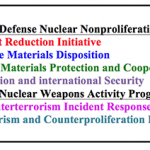The Pentagon, caught between a budget cap on defense spending and a long wish list of expensive weapons programs, will need to choose between what is nice to have and what is necessary and affordable for maintaining national security. There are many past examples of the Pentagon planning for a large number of weapons and then being forced to adjust its expectations and reduce its purchase of weapons systems due to rising costs and under-performance.
The Big Bad Sequester Wolf

Sequestration, the budget mechanism that kicks in if and only if Congress does not budget to the caps set under the 2011 Budget Control Act, has been framed as the big bad wolf of Washington. But this frequent mischaracterization of sequestration as a vague, threatening entity neglects a key facet of budget construction: sequestration won’t kick in unless Congress fails to do its job.
Audit the Pentagon Act of 2015 — Answering the Question: How is the Taxpayer Dollar Spent?

This month, Representative Barbara Lee (D-Calif.) introduced the bipartisan Audit the Pentagon Act of 2015, (H.R. 942) co-sponsored by Mike Burgess (R-Texas) and five others. It aims to do exactly what it says: audit the Pentagon. Why, you ask? Because unlike every other federal agency required by law to undergo an audit, the Department of Defense (DoD) has never done so.
Fact Sheet: FY 2016 Defense Nuclear Non-Proliferation Program Restructuring Explained
By Greg Terryn and Sarah Tully The National Nuclear Security Agency (NNSA), through the Office of Defense Nuclear Nonproliferation, administers several non-proliferation programs, each working to mitigate nuclear threats. The programs (detailed below) facilitate collaboration with international partners and other US agencies to better secure, monitor, and dispose of vulnerable nuclear material (military and civilian) […]
Weapons Acquisition and Contract Management Make GAO’s High Risk List – Again

Last week, the U.S. Government Accountability Office released its biennial update to its High Risk List – a compilation of government programs that are identified as “high risk due to their greater vulnerabilities to fraud, waste, abuse, and mismanagement or the need for transformation to address economy, efficiency, or effectiveness challenges.” Department of Defense weapon systems acquisition and Department of Energy contract management have both been on the GAO’s High Risk List for the last 25 years.

